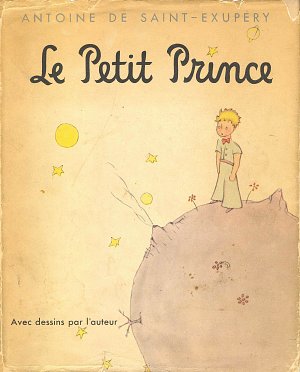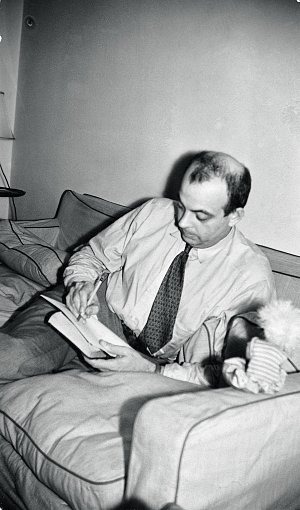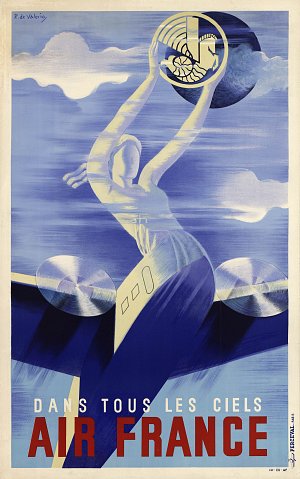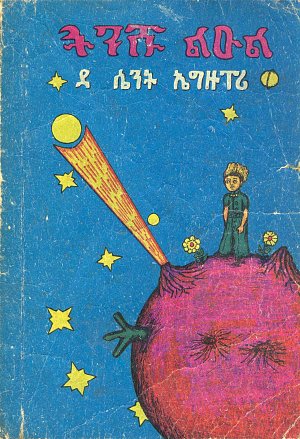
Antoine de Saint-Exupéry, First edition of The Petit Prince, 1943
Reynal & Hitchcock, New York (in French), 1943
© Fondation JMP pour LPP
This timeless story, punctuated
by whimsical, poetic illustrations, has
become a staple of children’s literature
while also presenting a message
of considerable philosophical scope.
Through the clues dispersed throughout
the texts, drawings and artifacts
presented, An Encounter with the petit
prince sheds light onto often overlooked
or unknown aspects of Saint-Exupéry’s
life while offering a more profound
understanding of this internationally
recognized and enigmatic story.
Heralded as a pioneer of aviation,
Antoine de Saint-Exupéry quickly became
a renowned writer. His first novel,
Southern Mail, published in 1929, became
an immediate success, while his second,
Night Flight, published in 1931, won the
author the Prix Femina award, a major
French literary prize. Saint-Exupéry then
partook in both air raids and promotional
tours with Air France and wrote engaged
pieces about the situations in Spain and
in the Soviet Union.
This hectic decade in the life of the
author is recounted in his autobiographical
work, Wind, Sand and Stars, which was
published on the eve of the Second
World War and constitutes a lasting
testament to the author’s entrenched
humanism. The Little Prince was written
during Saint-Exupéry’s exile in the United
States, where it was published in French
and English in 1943. Only in 1946 was
it published, posthumously, in Saint-
Exupéry’s homeland.

Antoine de Saint-Exupéry at the home of Silvia Hamilton, 1942
© Coll. Estate of Saint-Exupéry-d’Agay
An Encounter with the petit prince
traces the life of the author, beginning
with his birth on June 29th, 1900 and
his aristocratic origins in Lyon, followed
by his upbringing and education, his
interest in poetry, and his fascination
with airplanes, all of which influenced
his writings.
The exhibition continues with Saint-
Exupéry’s enlistment in the French Air
Force in 1921 before joining Aéropostale,
a French air courier service, where Saint-
Exupéry flew the Casablanca–Dakar route
in 1926 and later managed the Cape
Juby station in Sahara between 1927
and 1928. In 1929, Saint-Exupéry served
as director of Aeroposta Argentina. All
three experiences would go on to inspire
his first two works, Southern Mail (1929)
and Night Flight (1931).
The exhibition then reflects on the impact
of the airplane crash suffered by Saint-
Exupéry and his mechanic, André Prévost,
on a Saigon–Paris route in December
1935. This episode played a central role
in the narrative of Wind, Sand and Stars
and served as the opening scene of The
Little Prince.
The fourth segment of the exhibition
explores the fundamental importance
of drawing in the life of the author
as a means of reconnecting with his
childhood. In fact, it is through this artistic
medium that the petit prince and the
Aviator are acquainted: “If you please —
draw me a sheep.”.

Roger de Valério, Dans tous les ciels, Air France, 1935
© Photo: MAD, Paris / Christophe Dellière
The collection of drawings brought
together in An Encounter with the petit
prince further bears witness to the
author’s many talents, showcasing
many letters, drafts, notebooks, and
manuscripts adorned with drawings
by Saint-Exupéry.
The exhibition goes on to highlight two
major figures in the life of Saint-Exupéry
from his time in the United States —
he goes into exile in 1940 in an attempt
to convince the U.S. government
to enter the war alongside France.
This includes his wife, Consuelo, who
inspired the flower, as well as his dear
friend, Léon Werth. Werth, a fervent
opponent of colonialism and militarism,
is Saint-Exupéry’s literary mentor and
closest friend and the one Saint-Exupéry
dedicated The Little Prince to.
An entire room of the exhibition
is dedicated to the highlight of the
exhibition: the original manuscript
of The Little Prince, kept in the Morgan
Library & Museum in New York City and
presented for the first time ever in France
at the Musée des Arts Décoratifs. This
exceptional loan is complemented
by numerous unpublished original works
from another private collection which have
never before been shown to the public.

Antoine de Saint- Exupéry, Edition of the Petit Prince in Ahmaric, Addis Abeba, 1974
Translation: Habte Maryam Markos
© Fondation JMP for LPP
Finally, the posthumous life of The Little Prince is explored, with the prince serving
as the literary double who survives
long after the death of the author. The
disappearance of Saint-Exupéry, who died
serving in the Free French Air Forces
on July 31st, 1944, only helped to sanctify
the Petit Prince. The exhibition ends
with a ‘universal library’ that presents
one hundred twenty foreign editions
of his most recognized work, which has
since been translated into nearly five
hundred languages.
With An Encounter with the petit prince,
the Musée des Arts Décoratifs continues
its children’s literature exhibition cycle,
initiated with Une Histoire, Encore ! 50 ans
de création à l’école des loisirs in 2016
and Les Drôles de Petites Bêtes d’Antoon
Krings in 2019. Children, adults and their
inner children are all invited to share in the
humanistic message of hope brought
to us by Antoine de Saint-Exupéry and his
friend, the petit prince.